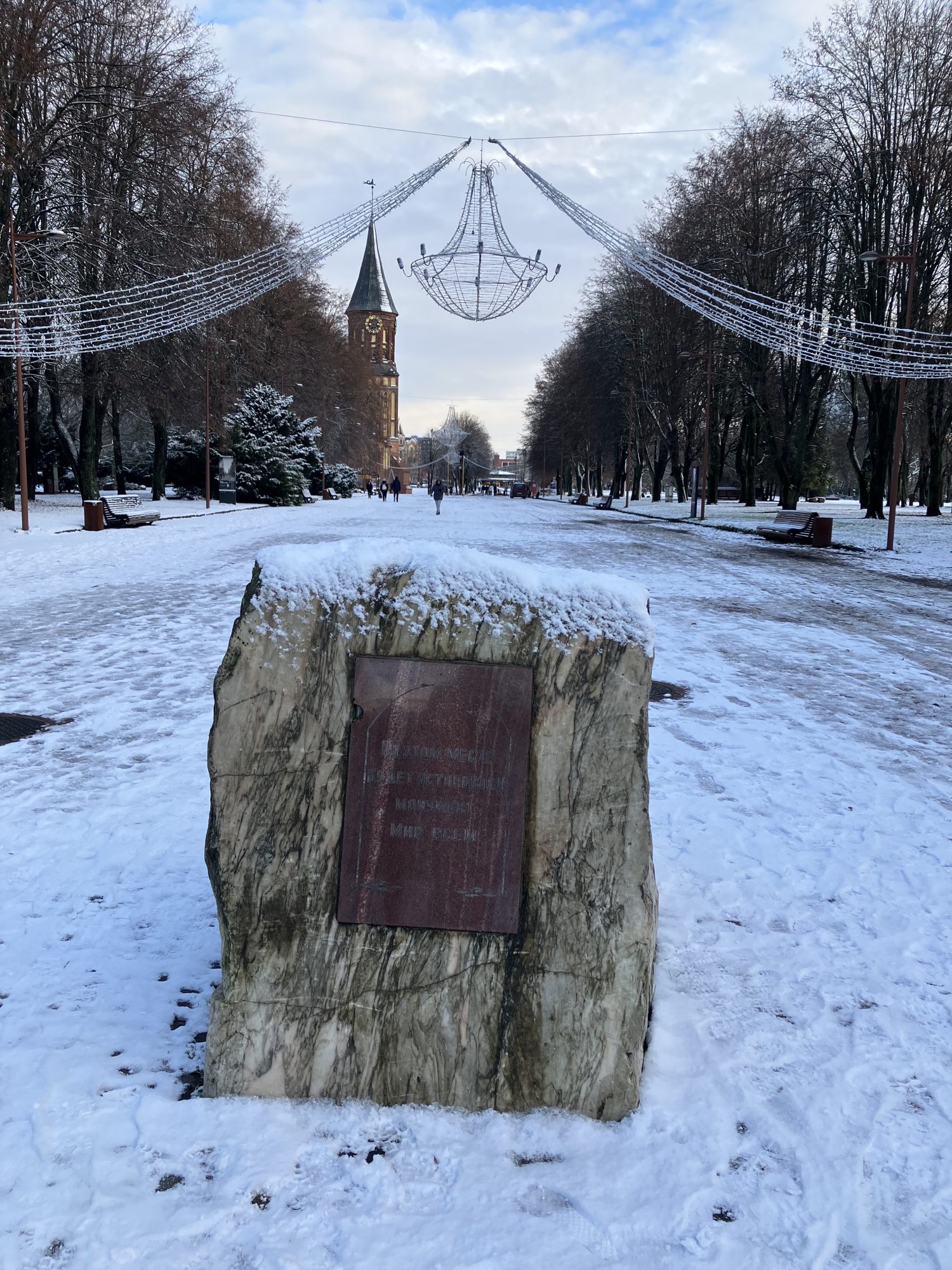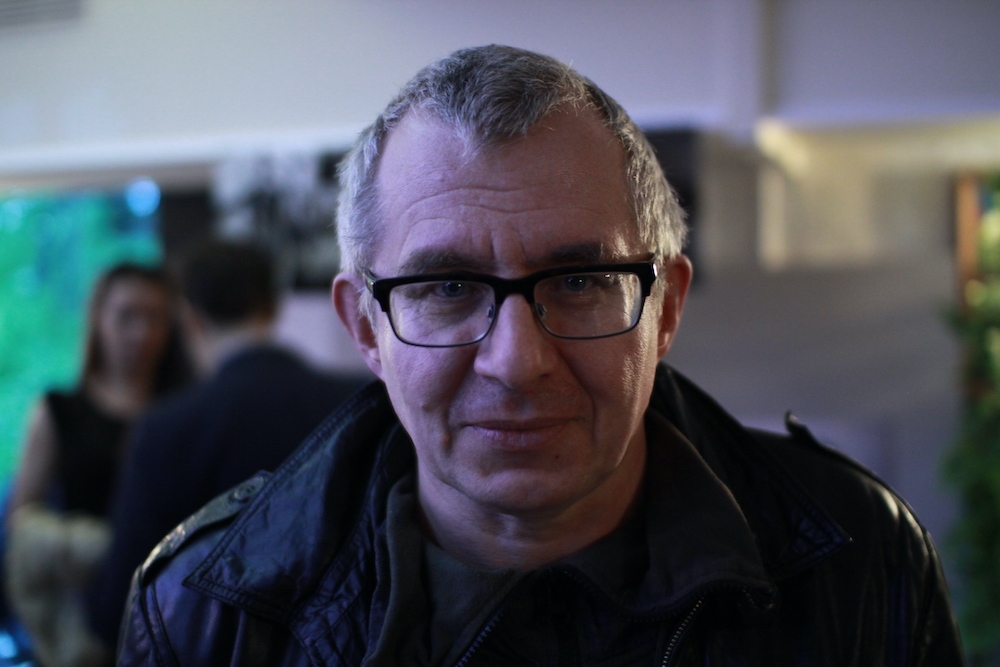Мир всем
Десять дней назад я приехал в Калининград. Когда я улетал из Сибири, градусник показывал -29 градусов. Через шесть часов я приземлился, температура ноль. Бывший Кёнисберг, бывшая Восточная Пруссия. Здесь все немного другое – город, дома, деревья. В парке растут дубы и буки, которым по триста лет. Трамваи ходят по рельсам, которым сто лет. Узкие непараллельные улицы старого центра сохранили брусчатку. Очень непохоже на любой другой российский город. До 24 февраля жители свободно ездили в Польшу в магазины. Сейчас граница закрыта. Идет война. Но она здесь не чувствуется.
Я часами хожу по улицам, смотрю на дома и на людей. Город сверкает огнями, отражается в реке. На острове Кнайпхоф готовят новогоднюю иллюминацию, развешивают гирлянды. Есть даже павильон, где можно выпить горячего глинтвейна. Почти как в любом другом городе Европы. Нигде в России не продают глинтвейн на улице перед Рождеством, а здесь – пожалуйста. На острове гуляет молодежь. Много туристов. Смеются, фотографируются на фоне Кафедрального собора, в котором сейчас музей, и с экскурсоводом, одетым в доспехи тевтонского рыцаря. Возле музея аттракцион: на экране в человеческий рост появляется Иммануил Кант и предлагает с ним сфотографироваться, снимок можно скачать на свой смартфон. Юноши и девушки с радостью делают селфи с Кантом. Вечером остров залит огнями. Идет война. российские ракеты падают на украинские города, в которых отключают электричество. Солдаты убивают людей. Но здесь это не чувствуется. Тревожным красным светом светится могила Канта, в которой его нет. На саркофаге-кенотафе на немецком языке его самая известная цитата о звездном небе над нами и моральном законе внутри нас. В бывшем Кёнисберге ее знает каждый школьник.
На аллее, ведущей от моста к собору, стоит камень. На камне можно прочесть надпись: «Здесь будет установлен памятник Мир всем». Никто не обращает на него внимания.
Friede allen Menschen
Vor zehn Tagen bin ich in Kaliningrad angekommen. Als ich aus Sibirien abflog, zeigte das Thermometer -29 Grad an, bei meiner Landung sechs Stunden später 0 Grad. Das ehemalige Königsberg, ehemaliges Ostpreußen. Hier ist alles etwas anders, die Stadt, die Häuser, die Bäume. Im Park wachsen 300 Jahre alte Eichen und Buchen. Die Trams fahren auf 100 Jahre alten Schienen. Die schmalen, nicht parallel angeordneten Straßen der Altstadt sind noch mit den ursprünglichen Steinen gepflastert. Keine andere russische Stadt sieht so aus. Vor dem 24. Februar konnten die Einwohner jederzeit nach Polen zum Einkaufen fahren. Jetzt ist die Grenze geschlossen. Es herrscht Krieg. Aber hier spürt man nichts davon.
Stundenlang wandere ich durch die Straßen und sehe mir Häuser und Menschen an. Die Stadt funkelt, spiegelt sich im Fluss. Auf der Kneiphof-Insel wird die Neujahrsbeleuchtung angebracht und Girlanden aufgehängt. Es gibt sogar einen Pavillon, in dem man Glühwein trinken kann. Fast wie in jeder anderen europäischen Stadt. Nirgendwo in Russland wird in der Vorweihnachtszeit Glühwein auf der Straße verkauft, hier schon. Auf der Insel spazieren junge Leute. Es gibt viele Touristen. Sie lachen, machen Bilder vor dem Dom, der jetzt ein Museum beherbergt und einen Fremdenführer, der eine teutonische Ritterrüstung trägt. Neben dem Museum gibt es eine weitere Attraktion: Auf einem Bildschirm erscheint Immanuel Kant in Lebensgröße und bietet den Touristen an, ein gemeinsames Selfie mit ihm zu machen. Das Bild kann man aufs Handy herunterladen. Enthusiastisch machen junge Frauen und Männer Selfies mit Kant. Abends ist die Insel in Licht getaucht. Es herrscht Krieg. Russische Raketen treffen ukrainische Städte, die von der Stromversorgung abgeschnitten werden. Soldaten töten Menschen. Aber hier spürt man nichts davon. Kants Grabmal, in dem er nicht begraben liegt, leuchtet in alarmierendem Rot. Das Kenotaph ist mit seinem bekanntesten Zitat auf Deutsch beschriftet, über den bestirnten Himmel über uns und das moralische Gesetz in uns. Im ehemaligen Königsberg kennt jeder Schüler dieses Zitat.
Auf der Promenade, die von der Brücke zum Dom führt, liegt ein Stein. Auf dem Stein steht die Aufschrift: „Hier entsteht das Denkmal Friede allen Menschen“ Keiner beachtet ihn.
Übersetzung: Irina Bondas
Peace Unto All
Ten days ago I landed in Kaliningrad. When I left Siberia, the thermometre was showing -29°C. Six hours later I had landed. Ground temperature: 0°C. Former Königsberg, former East Prussia. Everything’s a little different here; the city, the buildings, the trees. Oak and beech trees grow in the park, some three hundred years old. Trams roll along rails some hundred years old. The narrow, unparallel stone streets of the old centre still retain their original paving. Not at all like any other Russian city. Before February the 24th, the inhabitants freely crossed over to Poland for their shopping. Now the border is closed. There’s a war going on. But here you couldn’t tell.
I walk the streets for hours, looking at the buildings and the people. The city glitters with lights reflecting in the river. On the island of Kneiphof the New Year’s light display is being prepared, the bunting is being strung up. There’s even a tent where you can drink hot mulled wine. Like almost any other European city. In Russia, you won’t find mulled wine sold on the street any time before Christmas, but here – here you go. Young people are strolling about the island. Tourists aplenty. They smile, photograph themselves with the Königsberg Cathedral as backdrop, where there’s now a museum, with tour guides dressed up in the armour of Teutonic knights. There are amusements around the museum: a life-sized Immanuel Kant appears on a screen and invites you to take a photo with him. You can save the snaps to your smartphone after. Delighted adolescents take selfies with Kant. By evening the island is flooded with light. A war’s going on. Russian rockets fall on Ukrainian cities, where the power’s been cut. Soldiers are killing people. But here, you couldn’t tell. Red alarm-like lights illuminate the grave of Immanuel Kant, where he isn’t buried. Written in German, inscribed on the cenotaph, is his most famous quote about the starry heaven above us and the moral law within us. In former Königsberg every schoolboy would have known it.
On the way from the bridge to the cathedral there is a stone. On the stone one can read inscribed: „Site of the future monument Peace Unto All.“ Nobody pays it any mind.
Translation: Andrew Clarke
Share












